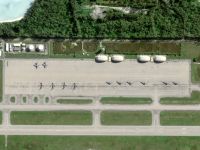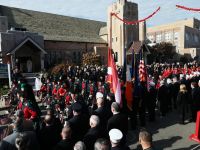Muslim religious institutions have reported an increase in charity payments, known as zakat, during Ramadan this year and are taking precautions to make sure the annual contributions reach people in need and don’t fall into the hands of armed groups.
The streets of Beirut are lined with posters imploring onlookers “I have given zakat, have you?” They are part of a campaign launched by Dar al-Fatwa, Lebanon’s highest Sunni religious authority, to revive the custom in the minds of Muslims by imploring them to pay the annual charity donation, considered an Islamic duty.
“Donations have increased 15-20 percent in the past three years,” explained Sheikh Zuhair Kibbe, the general director of Dar al-Fatwa’s zakat fund. “It may be because Dar al-Fatwa is better organized – our marketing campaign is more precise and getting the message across.”
Zakat is a form of charity paid by capable Muslims to the poor where they are required to dole out 2.5 percent of their total net worth to satisfy it.
Zakat funds are concerned with channeling the donations to orphans, the poor, disabled, and certain needy sheikhs.
While the number of donations has increased, so have those in need of financial support. “We get 2,000 to 3,000 new applicants each year,” Kibbe said. Dar al-Fatwa’s zakat fund currently helps 43,000 people. “That figure doesn’t include people who receive material aid, and that is a substantial number as well.”
Organizations accepting zakat donations approached by The Daily Star were unable to provide the total collected during Ramadan, when zakat is most often donated in keeping with the charitable spirit of the month, as the number is often tallied after Eid a-Fitr.
Farouq Rizk, from late Shiite Scholar Sayyed Mohammad Hussein Fadlallah’s Mabarat Association, stated that he was unable to give a proper estimate regarding the amount of gathered donations in comparison to previous years.
“I cannot give an exact estimate at this time, our collection services are always ongoing and we continue to receive donations throughout Eid and even after it,” Rizk said.
“We would have to wait till the accountants and designated persons review our income before we are able to give such an estimate. In all cases we compile yearly reports that detail all our income and expenses.”
He said that Mabarat, which has schools, orphanages and health-care centers, does not rely on the annual zakat to run its programming. Apart from donations, the association generates money through revenue collected from its many enterprises, such as popular restaurants and gas stations.
“What we do is important. That government is not able to help all of society, we can get where they [the government] can’t.” Rizk said.
Zakat-collecting organizations have also taken substantial measures to ensure the funds they receive find their way to people in need, and not armed groups with ulterior motives.
Dar al-Fatwa does a background check on individuals requesting zakat aid to make sure they are truly deserving of it. An individual will typically file an application seeking zakat assistance, after which point a representative from the institution will visit his home to assess his living conditions.
If the applicant arouses suspicion, Kibbe said, Dar al-Fatwa would conduct a second interview in its Aisha Bakkar headquarters.
Once an application has been accepted, individuals can only collect financial aid in person. In certain cases, family members can do so on their behalf.
But overall Dar al-Fatwa refuses few applicants on grounds of suspicious behavior or inclinations, around 0.5 percent of total applicants, according to Kibbe.
“Our representatives went to their homes and found flags and pictures commemorating armed groups and leaders,” he explained. “We are here to help the neediest of the needy, so the armed groups can take care of their own supporters.”
Kibbe said the possibility of accepted applicants funneling their zakat assistance to armed groups was slim. “We provide very little money to the poorest of the poor. These people are worried about how to eat every day, and the little we provide barely covers that. They would never think to send this money to a terrorist group.”
Sheikh Adnan Amama of the Muslim Scholars Committee based in Tripoli made assurances that individuals receiving zakat in the region were known to the organization.
“The way it works is preachers, in conjunction with the mufti of the mosque, devise a list of people known to be in need,” he said. This list is then passed on to the mufti in the region who allots the zakat.
Amama echoed Kibbe and dismissed fears that the funds might fall in the wrong hands. “We are only capable of giving limited amounts of money,” he said. “And the money we do provide is barely enough to cover food. Anything left over is usually used to purchase clothing.”
“If we give LL50,000 and you’re starving,” he said, “You would not think of giving this money to an armed group.”
By Nazih Osseiran








